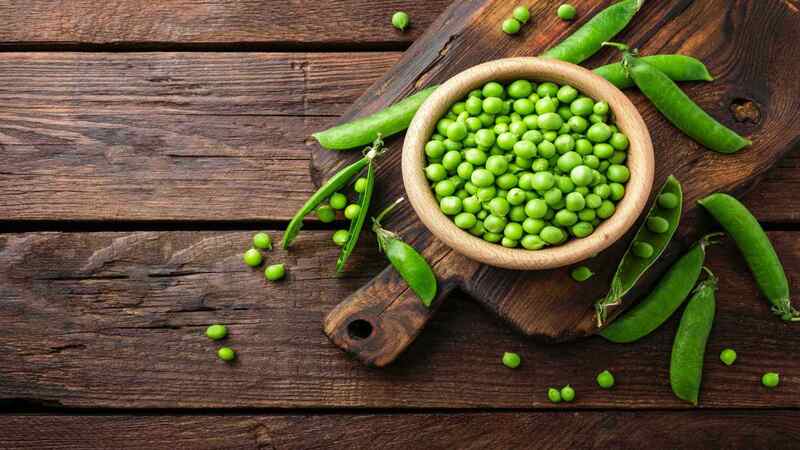
Being a parent is just not easy. It comes with a load of responsibilities so that your baby properly gets all the nutrition. Peas are also a nutritious ingredient that has ample benefits within themselves. All nutritious foods must be introduced at an early stage in the life of your newborn so that they develop their taste and at the same time a good habit to eat good food. According to experts, peas for babies are an excellent source of plant protein and prove to be healthy. Peas are a reliable source for maintaining gut health, and heart health and they act well as a blood sugar stabilizer.
Peas are famous for their nutty taste and their amazing benefits. Some of the prime benefits of peas include being enriched with vitamin C and boosting dietary fibers among various others. Some other benefits of peas include promoting healthy digestion and their antioxidant properties. Including green peas in your infant’s diet would ensure much-needed protein to them which is required in daily diet.
What Are Peas?
Green peas are considered to be a vegetable and are consumed both raw and cooked. Surprisingly though, peas actually belong to the league family. These are spherical and are packed inside pods which are extracted from them to prepare various food items. While the scientific name is Pisum Sativum these green peas are also popularly known as garden peas.
When Can You Introduce Peas to Your Baby?
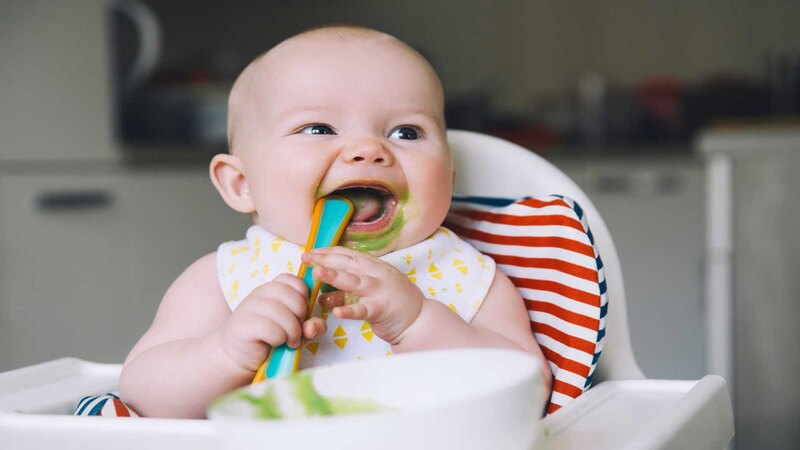
Solid foods can be introduced to your baby when they have hit the 6 months milestone. When they have reached 6 months of age, then you can start feeding them with peas. But remember to always start with small quantities. As they get used to eating peas, you can slowly increase the quantity.
Due to their shape and texture, whole peas can be a choking hazard for babies, especially when they are having it for the first time. Remember to boil the peas well to a soft texture, remove the skinny part, mash it well and then feed it to your baby.
Nutritional Value of Peas
One cup(145 grams) of peas will nourish your little one’s body with these nutrients.
| Nutrients | Value |
| Calories | 117 |
| Total Fat | 0.6g |
| Saturated Fat | 0.1g |
| Sodium | 7.3mg |
| Total Carbohydrate | 21g |
| Dietary Fiber | 8.3g |
| Sugar | 8.2g |
| Protein | 7.9g |
| Calcium | 36mg |
| Iron | 2.1mg |
| Potassium | 354mg |
Amazing Top 5 Health Benefits of Peas For Babies
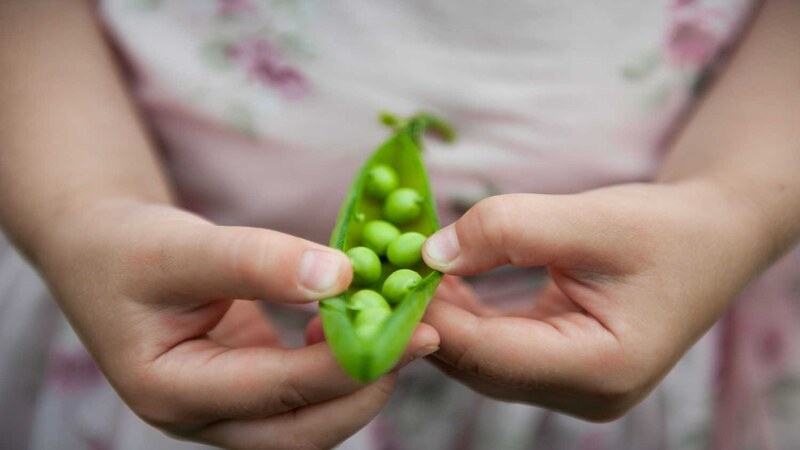
As we have already discussed above, peas are helpful for babies as they contain nutrients that are required by the baby’s body. In the growing years, a baby is in the utmost need of nutrition, and hence making your infant consume peas would give them ample benefits mentioned below:
1. Ensures Stronger Bones
As peas are filled with a good quantity of minerals such as zinc and iron, it helps in building up stronger bones for your baby. Peas contain a good quantity of both of these ingredients which are required to make the bones stronger.
2. Improves Immunity Levels
In the growing years, your baby is in utmost need of immunity. Due to an immature immune system they risk catching infections easily. The high levels of antioxidants present in green peas help fight these infections as they continue developing their natural immune levels.
3. Great For Vision
You might have heard people saying that you should feed your baby with green vegetables. This is because green vegetables are good for eye health. Peas are rich in Vitamin A and contribute to proper vision health in babies. Also, vitamin A helps to protect the baby’s eyes from damaging free radicals which would also help in maintaining mucous membrane. Furthermore, peas also have lutein and carotenes which take care of your baby’s eye health.
4. Stimulates Hair Growth
Well, as you may know, green peas are a rich source of iron, zinc, protein, and other nutrients which helps in making the hair stronger and promotes hair growth. In babies, nutrients which help in hair growth are essential and that is why peas are a good intake for small babies.
5. Packed With Potential Anti-oxidants
Antioxidants such as phenolic compounds are essential in a baby’s body and green peas are a good source of it. These contain tannins which are known to have high antioxidant activity. It is very essential to have antioxidants in a newborn’s body so that there’s no risk of chronic health illnesses.
Are Peas a Common Choking Hazard For Babies?
Many parents think a lot of times before feeding their babies peas. This is because they think that the round peas might choke their babies and that is why they even consult the doctor about whether they should feed their babies with peas or not. Round-shaped vegetables such as can pose a risk for your baby. Babies can accidentally swallow the entire pea without chewing it, which can choke them.
This is why cooking and serving peas the right way becomes very important. Well-cooked and mashed peas are the perfect food for your baby. Choking risks are minimal and you baby can enjoy all the nutritional benefits.
[Read : Infant Choking]
How Do You Introduce Peas to Your Baby?
Your baby would find peas very attractive as they are green in color and sweet in taste. While introducing peas to your baby initially, it is better to cook and mash them before feeding them to your baby. Doing this would make the peas soft and and hence it would be easier for them to chew them. You can even add some breast milk to it to make it more nutritious and easier to consume for your baby. A 6-month-old baby can consume peas easily in this manner.
Do not feed whole peas to your baby at least until they turn 18 months old.
[Read : The 3-Day Wait Rule For Babies To Introduce Solids]
Precautions to Take While Feeding Peas to Babies
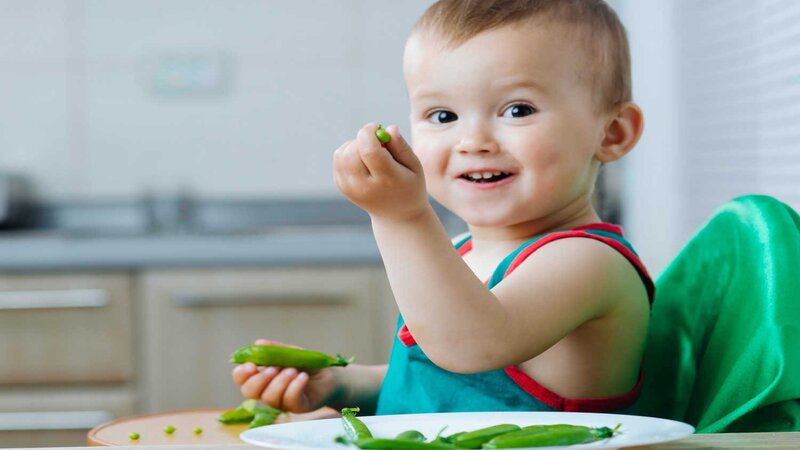
There are some general precautions that you must take so that your baby doesn’t land in any choking trouble because of feeding them peas. Keep reading to know them:
- Always start with small quantities and slowly increase once your baby gets comfortable with eating peas.
- Boiled, deskinned, and mashed peas do not cause any choking hazards to your baby.
- If you are feeding your baby peas for the first time, do consult your doctor to know if you’re doing the right thing or not.
- Know any possible side effects of peas on your baby’s body. If you see that your baby is exhibiting allergic reactions or side effects after eating peas, stop immediately and consult the pediatrician for a further course of action.
Are There Any Side Effects of Peas For Babies?
Although peas are a nutritious source for babies for energy and several other things they even have some side effects too. As we’ve already discussed above, eating more than intended would choke your baby and hence this can cause complications.
Let’s have a look at some of the possible side effects of peas for the baby.
1. Allergic Reactions
If your baby is allergic to peas they may develop skin issues such as itching, rashes, redness, skin irritation, hives, etc. Digestion issues such as gas, bloating, diarrhea, nausea, vomiting, and indigestion are also possible. Some babies may develop breathing issues, blocked or stuffy nose, etc.
Excessive intake of peas can also create havoc with your baby’s health.
2. Impacts Kidney Health
Protein is good for the body but if it is consumed in larger quantities, it can impact the functioning of the kidney. In other words, it can also increase the uric acid level in the body which can cause pain in joints.
3. Reduces Absorption of Essential Nutrients
Nutrients are good in minimal quantities. Larger quantities can cause complications and hence this can reduce their goodness in your body. Well, if you consume nutrients in a large quantity, then it can reduce the iron, calcium, and zinc absorption in your body which is not good for your body’s functioning.
[Read : Calcium For Babies]
4. Might Cause Bloating
Babies can face problems such as bloating and constipation and hence this can be possible with overconsumption of peas. Well, as per some experts, it is known that peas contain a substance which is known as lectin. This can cause issues such as constipation and bloat in your kids, which is not a good sign at an early age of development.
Top 2 Tasty and Healthy Peas Recipes For Babies
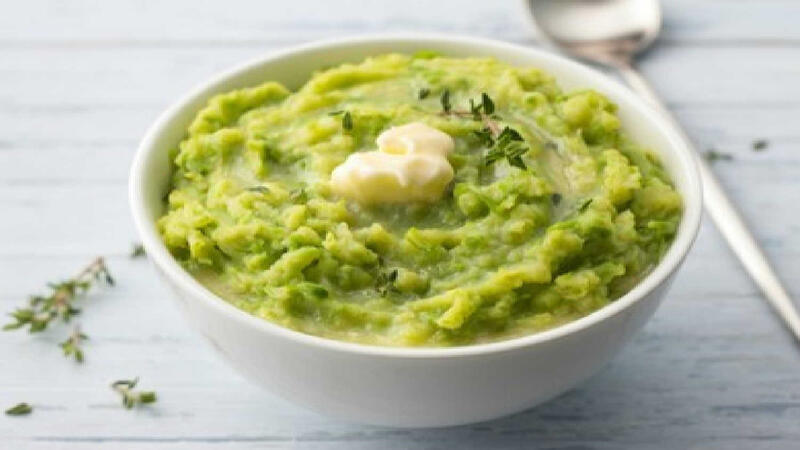
Your kid might like to eat peas in a different style. So here are the top 2 healthy pea recipes that can be considered for your babies:
1. Potato Green Pea Mash
Potato and green peas are a match made in heaven. You can steam potatoes and green peas separately, remove the skins, mash them together and feed them to your baby.
2. Green Pea Khichdi
Add green peas to your basic khichdi preparation. The end result will be yummy and nutrient-rich for your baby.
Green peas for babies are an excellent source of nutrition and babies love the sweetness of these cute little legumes. Remember not to feel whole peas till your baby is at least a year old. Keep your baby away from dry and raw peas as they have a huge risk of choking.
FAQ’s
1. Are Peas Hard to Digest For Babies?
No, in fact peas are easy to digest and an excellent source of nutrition. Cooking and serving the right way are the key to ensuring that your baby gets the full benefits of green peas.
2. Are Peas Gassy For Babies?
When consumed in excessive quantities, green peas can cause gas problems in babies. Moderate consumption is absolutely safe and will not cause any problems.
3. Are Frozen Peas Good For the Baby?
Yes, frozen peas are processed under strict conditions and do retain their nutrition. In the absence of the availability of fresh peas, you can always opt for frozen ones. Do ensure that the stock is fresh and well within use by date. Throw away any expired stock.
4. Do Peas Cause Constipation in Babies?
Peas contain soluble and insoluble fibre which helps your baby’s poop to become softer, thus helping resolve constipation in them.
Read Also: Radish For Babies – When to Introduce, Benefits, and Precautions

